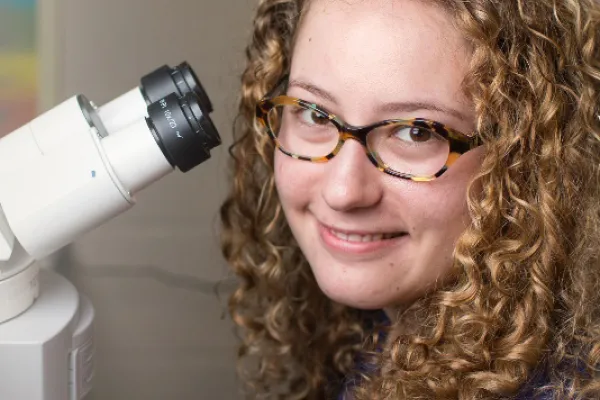Morgan Schwartz ’18 Earns Goldwater Scholarship
Research & Inquiry

Published March 11, 2017
Morgan Schwartz ’18 has always been interested in the brain.
Throughout junior high and high school, she volunteered as an equestrian coach for young people with autism and ADHD. “I wondered what caused my riders’ brains to function differently from mine,” Schwartz said.
That casual wondering led her to a biology major at Smith with a focus in neurodevelopment—and now, it’s earned her the nation’s most prestigious undergraduate STEM award.
Schwartz is one of just 240 college students in the United States to receive the Goldwater Scholarship, awarded annually to college sophomores and juniors planning to pursue research careers in the natural sciences, mathematics or engineering. The one-year scholarship covers up to $7,500 per year toward tuition, fees, books, and room and board.
For Schwartz, it’s an opportunity to build on the great research opportunities she’s had at Smith—and off campus, too. A STRIDE Scholar—first in Professor Laura Katz’s microbial diversity lab and now in the zebrafish laboratory of Professor Michael Barresi—Schwartz is studying the connections that form between two halves of the brain and developing software designed to quantify differences in brain structure.
“Basically, we’re learning how the brain is wired,” she says, “how it’s put together and how it’s patterned.”
She conducted similar studies this past summer as a research scholar at Janelia Research Campus, a pioneering neuroscience research center run by the Howard Hughes Medical Institute, where her work was shaped by a variety of different scientific perspectives that she now uses strategically to tackle problems in biology, says Smith biological sciences professor Michael Barresi.
“Morgan is a biologist, a geneticist, a mathematician, a neuroscientist and a computer scientist,” Barresi says. “But, more importantly, she will become whatever scientist she needs to be to solve the problems that need solving now and in the future. She has independently pushed our science into new areas that are often foreign—even to me,” he adds. “But Morgan uniquely possesses the courage, enthusiasm and determination to solve any problem.”
A dedicated researcher who chooses her courses in part for the research skills that they will help her develop, Schwartz says she almost didn’t apply for the Goldwater because “I was worried about the time commitment.” In the end, though, “it turned out to be a great opportunity!”
She says the process has helped her articulate her research and think about what topics she’d like to investigate next. “I’m at the point in my scholarship where I don’t just want to follow the path laid out for me,” she says. “Instead, I’m starting to have my own ideas and my own vision of where I want my work to go.”
To that end, Schwartz is thinking about graduate school in England and then a career in academia.
“I’d really like to be a professor in an undergraduate setting,” she says. “I love doing research—being in the lab, exploring things and tackling surprises as they come up. And I’ve received such incredible mentoring at Smith, I’d love to be able to give some of that back.”